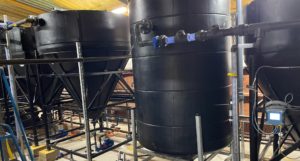£2.5M additional funding for Exeter-led UK Metamaterials Network

Exeter academics have secured an additional £2.5m of funding from EPSRC to support the UK Metamaterials Network for an additional 4 years and transforming it into a “NetworkPlus”.
Exeter academics have secured an additional £2.5m of funding from EPSRC to support the UK Metamaterials Network for an additional 4 years and transforming it into a “NetworkPlus”.
The NetworkPlus will ensure the UK is a global metamaterials leader, spearheading the future of novel science and technology, with ambitions to grow a national metamaterials ecosystem and facilitate the development of innovative metamaterials through pump prime funding and collaboration. It will be formally launched at the Metamaterials UK Conference and Forum 19th-23rd May 2024.
The UK Metamaterials NetworkPlus will be led by the Director of Exeter’s Centre for Metamaterial Research and Innovation, Professor Alastair Hibbins, alongside a team of co-project leads from across the UK, including Dr Katie Shanks from Exeter’s Environment and Sustainability Institute and Dr Helen Rance from Exeter Innovation.
Metamaterials have phenomenal potential, these artificial 3D structures are comprised of at least two different materials. This combination and the structure then gives a metamaterial a property beyond those of the materials used to make it. They will transform our economy in a digital age, helping to address society’s challenges. They will contribute to achieving technological breakthroughs in our ability to control and process energy and information, for example in sustainability through energy harvesting devices, health care via impact protection in contact-sport, communications e.g. antennas and increasing bandwidths, providing defence and security capabilities, enhancing computation techniques and benefiting the space and aviation industries.
The NetworkPlus will drive an increase to UK research in this vital technology area. It will bring together experts from academia, industry and government to accelerate progress towards the UK’s technological priorities. It has an essential role to play in maintaining and growing UK leadership in discovery science on the global stage.
The NetworkPlus aims to develop the UK’s potential as a thriving, innovation driven, research and industry base. To do this the NetworkPlus aims to:
- bring together the current and next generation of academic, start-up and industry leaders in the UK, and open the field beyond its traditional boundaries;
- provide a reliable nexus for information, experts and cutting-edge science and technology;
- support pilot and explorative projects to initiate research areas which are new to the UK or strategically important;
- support the development of close links between government, academics and industry, providing a strong advocacy for metamaterials activities;
- work to create a strong regulatory framework and shape international norms and standards;
- showcase metamaterials potential, growing its potential in the UK.
The award will run for four years until September 2028 and will help develop game-changing breakthroughs. It will build the UK’s skills pipeline, driving through generation-after-next technology and high-value products.
Professor Alastair Hibbins said, ‘The scope of metamaterials is huge; metamaterials as a concept provides the opportunities to control information and energy through careful structuring of conventional materials. For the last few years, Dr Claire Dancer from the WMG at the University of Warwick and I have co-led the Network, and we’ve been working incredibly hard to forge a new UK ecosystem for metamaterials where we work together to support each other, and drive work into areas that require multidisciplinary approaches to solve global challenges.’
Co-project lead, Dr Katie Shanks from the University’s Environment and Sustainability Institute in Penryn, added ‘I’m leading the Sustainability challenge within the new NetworkPlus, an exciting focus point for the rapidly developing area of metamaterials in diversifying and enabling sustainable materials and technologies for a net zero future. This also fits perfectly with my own research interests in solar concentrator technology. The NetworkPlus is a unique collaborative community of mathematicians, engineers and physicists, with strongly engaged industry and government partners, and we are so excited about what we can achieve together, across sustainability and beyond!’
Co-project leads for the award are based at the University of Exeter, the University of Warwick, the University of Cambridge, the University of Sheffield, Manchester Metropolitan University and the University of St Andrews. Members of the leadership team are also based at Sheffield Hallam, Queen Mary University, the Defence Science and Technology Laboratory (Dstl), MBDA Systems, Imperial College London, the University of Nottingham, M. Ventures, QinetiQ, Durham University, and the National Physics Laboratory (NPL).



